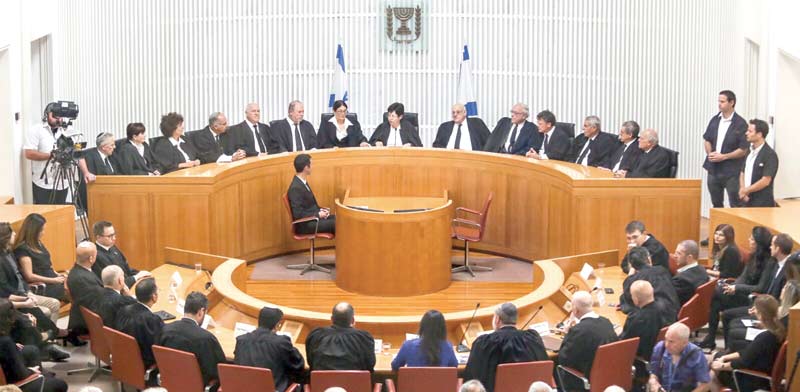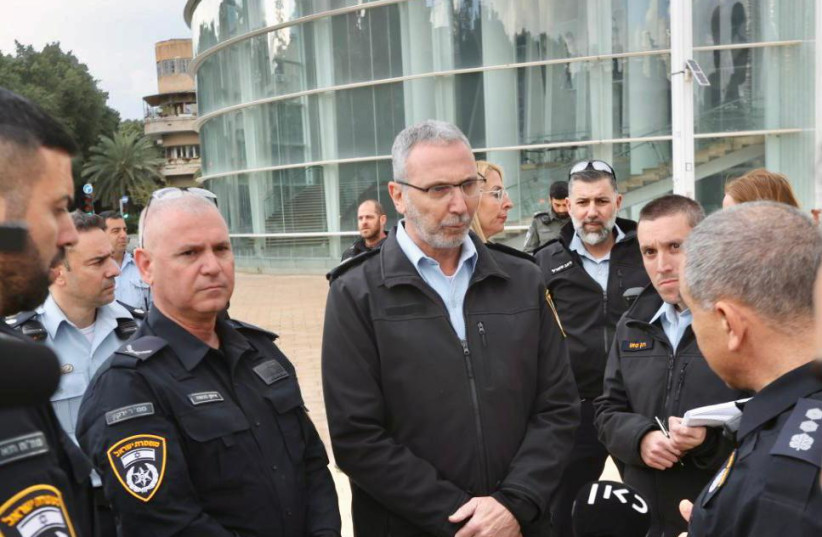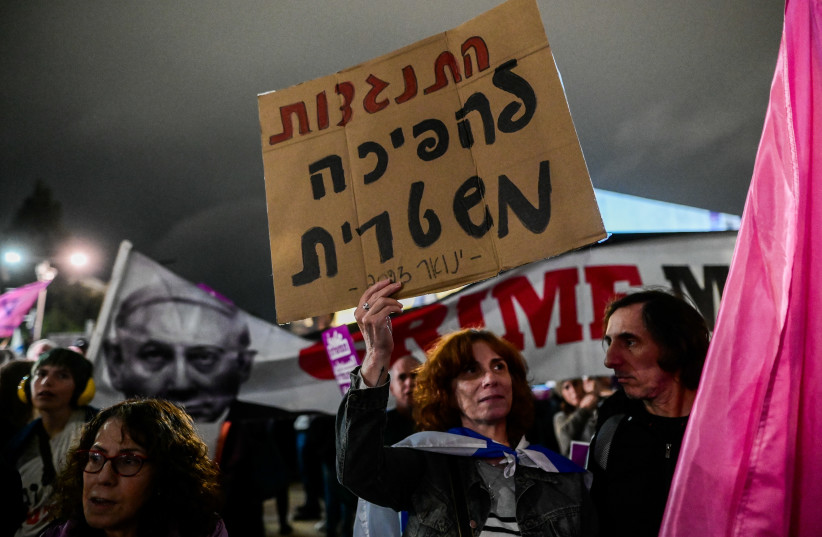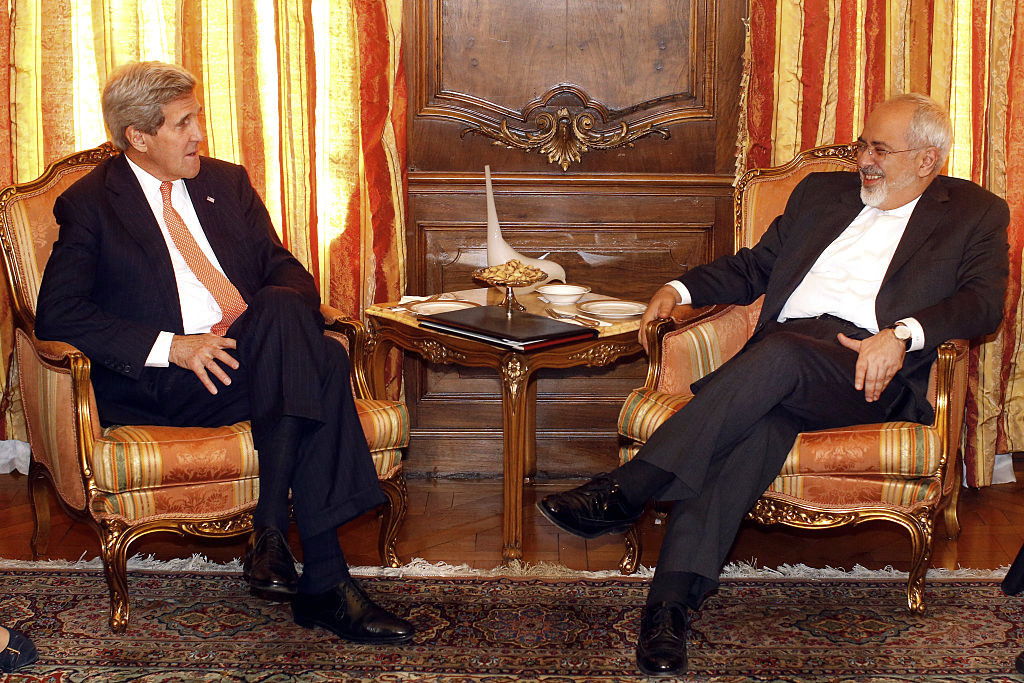by Yaakov Katz, Yonah Jeremy Bob
Aviv Kohavi wraps up his term and tells the ‘Magazine’ about plans for war with Hezbollah, attacks on Iran, and concern over new legislation.
 |
IDF CHIEF of Staff Lt.-Gen. Aviv Kohavi: Hanging up his uniform.
(photo credit: IDF SPOKESPERSON'S UNIT)
|
In March, Israel will mark a decade to what the IDF calls the “Mabam” – a Hebrew acronym for the war-between-wars, otherwise known as the covert shadow campaign that the country wages fiercely against Iran and its regional proxies.
Back in 2013, when the Mabam first started, there was a total of three attacks the entire year. In 2014, the number increased to about eight. Nothing, though, has been like the past year during which the IDF has an Iranian target somewhere in the Middle East, on an average of at least once a week.
These are attacks that take place in Syria, Lebanon, Iran, Iraq and beyond. Some we hear about; many we don’t. Some are seamless and go by without a single enemy shot fired; some see Israel Air Force fighter pilots coming under intense enemy missile fire.
What it means is that although the public might not feel it, the IDF is constantly operating, seeing action, and preparing for war.
The man who has overseen this rapid pace of operations is Lt.-Gen. Aviv Kohavi, the IDF chief of staff who will hang up his uniform on Monday after more than 40 years of service. One success he takes pride in is denying Iran the ability to establish a “Hezbollah II” in Syria.

The last four years have been intense. In addition to the significant increase in Mabam operations, Kohavi has overseen four operations against Hamas and Islamic Jihad in the Gaza Strip; he forged a unique alliance with the US military; he traveled the Middle East; he initiated a revolutionary digital transformation throughout the military; he prepared the IDF for war with Hezbollah; and he also upgraded operational plans and training for what could one day be Israel’s most complex mission in its 75-year history: an attack against Iran’s nuclear facilities.
In an extensive interview with The Jerusalem Post from his spacious office at the Kirya military headquarters in Tel Aviv, Kohavi spoke openly about his concerns about the new government’s plans to change the way the Civil Administration operates in the West Bank. He spoke about his phone call a few weeks ago with Benjamin Netanyahu before the government was formed and how it was “his duty” to voice this concern.
While there is concern domestically, he brushed away the possibility that the new government’s reforms will undermine the strategic military-security relationship the IDF has forged with the US military. He praised Chairman of the Joint Chiefs of Staff Gen. Mark Milley, saying that his affinity and support of Israel is “powerful and inspiring.”
Turning to Israel’s different fronts, Kohavi warned that if a new war broke out with Hezbollah, Israel would send Lebanon 50 years back in time through what he called “waves of firepower” that Israel would unleash on the Iranian-backed militia group, as well as against Lebanese national infrastructure.
“Hezbollah and [Sheikh Hassan] Nasrallah know that Lebanon will be hit in an unprecedented way, which it has never experienced in its history,” Kohavi said. “A third Lebanon war will see a powerful attack that they have never experienced. They know this.”
“Hezbollah and [Sheikh Hassan] Nasrallah know that Lebanon will be hit in an unprecedented way, which it has never experienced in its history. A third Lebanon war will see a powerful attack that they have never experienced. They know this.”
Aviv Kohavi
When it comes to Iran, Kohavi is just as confident in the IDF’s capabilities to deal Ayatollah Ali Khamenei’s nuclear program a devastating blow.
“We will be ready at any point that the political echelon tells us to, whether it is in the coming months, or in another year, or if it is in another three years,” he said.
The following Q&A with Kohavi was edited for length and clarity.
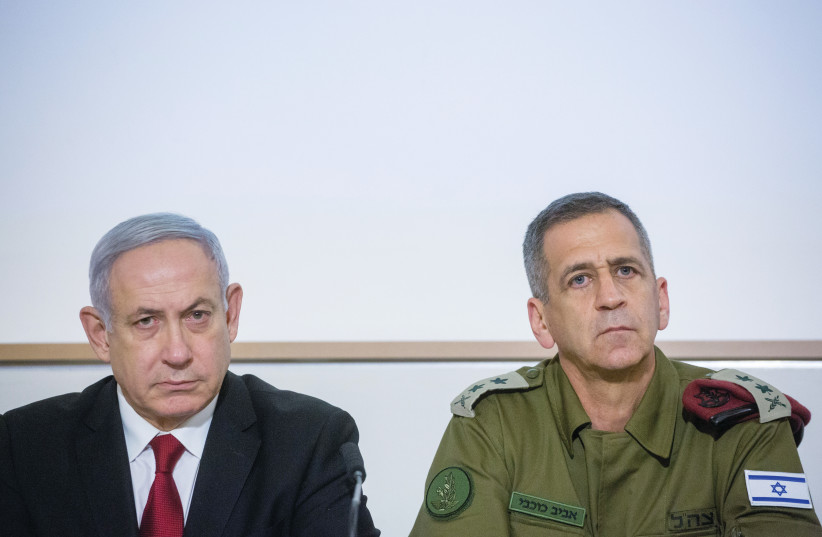
You spoke to Netanyahu recently by phone. Putting aside what was said, why bother making the call when you have just a few weeks left? It’s your successor’s problem.
In principle, I think that issues like this, and certainly security issues, need to be dealt with behind closed doors. The publicity on this did not come from us. The intention of the call was to point to the fact that there might be decisions taken that could undermine the IDF’s operational capabilities or the IDF’s values. I asked and insisted on the opportunity to voice all the reasons and consequences of the decisions before they are made, since as we know, there are differences between what is written in the coalition agreements and what happens in reality.
It is my duty to do this. I am the chief of staff until the final second of my term. Since these are the days that they are going to make the decisions and I am the chief of staff, there is no question that it is my duty.
I was happy that the prime minister said that we will discuss and work out the issues.
How concerned are you?
It is not a question of concern. I am a professional and we, in the IDF, have two compasses – the professional compass that we use to set our doctrine and rules, as well as the ethical compass.
There are two different issues here. On the professional and regulation side, for example, there is the matter concerning the Civil Administration. Since Judea and Samaria are under IDF rule, then by definition, I am in charge of law and order to prevent terrorism and establish security. If we are responsible, then we need the tools to act; and that is why it was decided a long time ago that the Civil Administration is under the Coordinator of Government Activities in the Territories, and there is a connection between military operations and the civil activities and vice versa.
Let’s say that tomorrow there is a decision to pave a new road for residents. This has security implications. Let’s now say that tomorrow I will want to pave a road for security reasons. This will have implications for residents and this might mean, for example, that on this new road, a community will now be exposed to terrorist activity.
Therefore, there was logic when those before us decided that the Civil Administration – which is essentially a small government in Judea and Samaria – will have a civil dimension and a military dimension, and I need to reflect this to the prime minister, the defense minister, and the political echelon so they understand the implications of their decisions. In the end, it is their right to decide, but it is my obligation to point to the situation and reflect to them what could happen.

Let’s connect this to the relationship you’ve forged with the Americans. You have very close ties with [General Mark] Milley and recently received the Legion of Merit from him. The relations have apparently never been closer. Are you concerned this could change because of the political situation?
My experience in relations with different countries did not start with my appointment as chief of staff but 15 years earlier since I was head of the IDF Operations Division. I can say that the relations – certainly with the US – are stronger than political moves.
The relations have only grown. They are not an example of cooperation but of a true partnership. Because the relations are so strong, I am not at all worried. What we get from them and what they get from us is based on [common] interests but also on solidarity, and it is deep and tight and stronger than any relationship between governments.
People tend to think that Israel is the recipient of benefits from the US – fighter jets, weapons and military aid. Can you tell us what we give them?
We give them a lot on the political-diplomatic level, but it is not my job to talk about that. From the military perspective, we give them a lot of intelligence. Secondly – and I cannot give too much detail about this – we cooperate and give them a lot of advantages when it comes to operational methods, fighting methods and weapons systems.
You were chief of staff when there was tension between Israel and the US surrounding Iran. There was one government that decided to fight publicly with the US, and there was another government that wanted it to be behind the scenes. What do you think now that you have seen both play out?
It is not for a chief of staff to recommend to the government how to manage this. I can tell you that we, in the IDF, maintain a close dialogue with our US colleagues behind closed doors that is substantive. We clarify issues, and in a number of cases we have been able to portray the updated and right reality to the Americans and even convinced them that our position was right.
Can you give an example?
When we [Milley and Kohavi] sit for hours, the one-on-one meetings have a lot of impact. You can bring the person in front of you into your shoes to see things the way you do. If you use facts and strong arguments, rationale, the people and people who care about the State of Israel [can be convinced].
You have no idea what type of strong affinity Milley, CENTCOM chief [Gen. Michael] Kurilla and [Gen. Kenneth] McKenzie before him, have to the State of Israel and the Jewish people. It is powerful and inspiring. So they also are convinced. I can tell you that behind the 1,000 Iron Dome interceptors were the ties we have with the US military and with Milley. The decision not to delist the Islamic Revolutionary Guard Corps from the US terror list was also because of our relationship with the US military.
Did you share intelligence on this with them?
Yes, and we also worked out what the significance would be if the decision was made. The significance of the Quds Force was discussed between me and Milley in private. I know that he personally influenced President Biden.
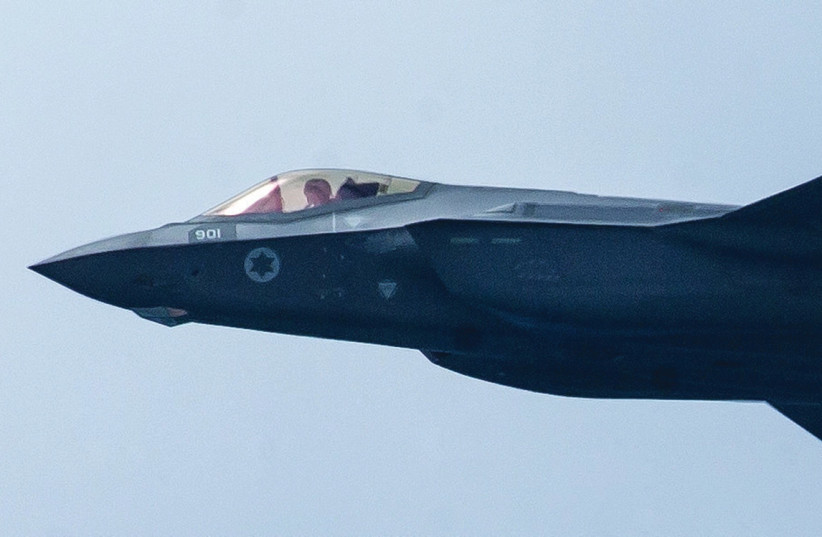
 THE IDF’S F-35 ‘Adir’ stealth fighter plane. (credit: MOSHE SHAI/FLASH90)
THE IDF’S F-35 ‘Adir’ stealth fighter plane. (credit: MOSHE SHAI/FLASH90)

Let’s talk about the Mabam. You mentioned that there is, on average, an Israeli attack against Iran once a week somewhere in the Middle East and how they have not succeeded in creating the force in Syria that they wanted.
We started 10 years ago in 2013, and there were three attacks the whole year. Our average today is more than one a week, and we crossed 52 operations in 2022.
They still try because like in every battle – strategic or tactical – just because one side succeeds does not mean that the other side withdraws completely.
Iran still has a desire – even if they don’t actualize the entire vision of [former Quds Force commander] Qasem Soleimani, which in this sense has failed – to put weapons and advanced capabilities in Syria. Although we undermined a large portion of the plan, it doesn’t mean they have stopped trying.
We have not finished, and I don’t think [the Mabam] will finish in the next year or two. There will be more attempts, but there is no doubt that we have prevented what was supposed to be there. They wanted hundreds of surface-to-air missiles and surface-to-surface missiles. They wanted tens of thousands of militiamen and a second Hezbollah. All of this was thwarted completely.
The IDF put out a report that it succeeded in stopping 70% of the weaponry from flowing into Syria. This means 30% made it in. If it is precision munitions, then that means they can strike strategic targets in Israel.
Firstly, the 70% is now more than 90%. This is a fact. We have gotten better, but you are right that some percentage manages to get in, and that is a challenge. Some of our action is to block the crossings – by air, ground or sea – and some is to hunt what gets in. Just look at the media reports and understand where we operate.
BORN IN 1964, Kohavi enlisted in the Paratroopers Brigade in 1982, and then spent the next 25 years in the field.
The year 2002 was a turning point. Suicide bombings were a weekly occurrence in Israel. The attacks would prompt then-prime minister Ariel Sharon to authorize the IDF to launch Operation Defensive Shield and take firmer control of the West Bank.
Kohavi received one of the hardest targets – the Balata refugee camp near Nablus. The largest refugee camp in the West Bank, Balata was then home to around 25,000 people in just a quarter of a square kilometer.
Before the operation, the Palestinians had used the time to get ready. Hundreds of gunmen had set up positions in the camp, digging trenches and booby-trapping front doors and narrow passageways. The Palestinian gunmen defiantly dared Israel to send troops inside. Kohavi knew that if not done right, he could be marching his men into a disaster.
But Kohavi was determined. He knew that this would be the test for the IDF. “The Palestinians have prepared the stage for a show that they want to direct,” Kohavi told his officers before the incursion. “They expect us to follow their orders. That is exactly what we won’t do.”
On the eve of the operation, Kohavi sent his battalions to surround the camp. One took up positions to the northeast; another to the southeast. He wanted the Palestinians to think that he was going to order his men straight into the death traps they had set for them.
But then something else happened. The soldiers entered the homes and buildings on the outskirts and started crossing from one structure to the next. They hammered through walls or blew holes with small explosive charges. They were literally walking through the walls.
This protected the soldiers but also had another result – it forced the gunmen out to the streets where the soldiers – now covered inside homes – could engage them from a point of cover. The operation took four days. While Kohavi lost a soldier, some 20 gunmen were killed, and dozens of others were arrested.
The innovative tactic got the attention of the IDF’s top brass, and Kohavi continued to climb the ranks, serving as head of the Gaza Division, head of the Operations Division, head of Military Intelligence, and then the Northern Command before taking up the top military role.
Kohavi told his men over the years that being polite does not create strength. Israel’s enemies, he explained, understand one language – that of force and lethality. So when he became chief of staff in 2019, he vowed to make the IDF more “lethal and efficient.” Three months after he took the reins, he began a revolution, starting with improving the IDF’s ability to identify and destroy the enemy with multi-dimensional blows.
He established new units, including Ghost – a combat force that integrates cutting-edge technology, soldiers from multiple units, as well as an AI-powered target-creator in Military Intelligence. It churns out new targets weekly across Israel’s various fronts. In the past, the Operations Division was able to create 15 targets a week; today, it can create 50 to 100.
It was only natural that under his watch, precision would also become one of the military’s top priorities.
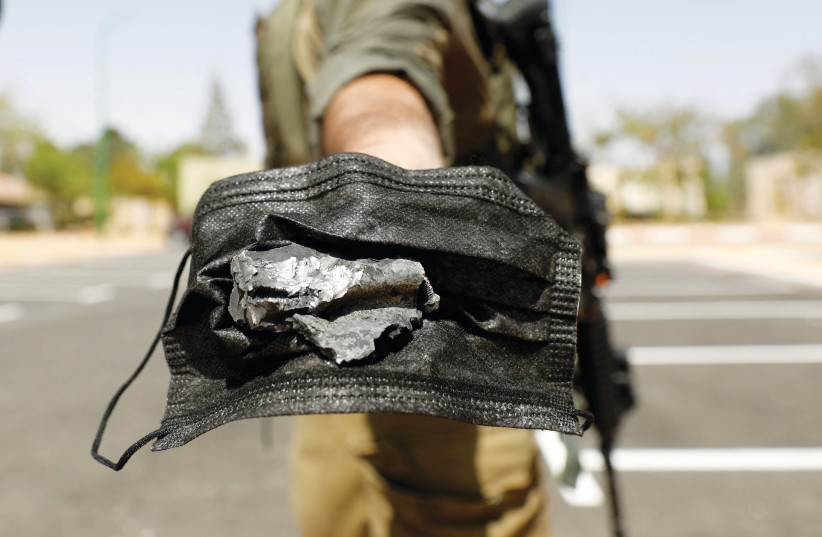
The common denominators of the operations you oversaw in the Gaza Strip, as well as the Mabam, are precision and very little collateral damage. No other military has this level of accuracy. Explain how this happens.
There were four operations in Gaza. In Operation Black Belt [2019], there were hours of discussions on how to take out [Islamic Jihad commander] Baha Abu al-Ata in his apartment without hurting his sleeping children. And that is what happened.
There were discussions about where he sleeps, on what side, what angle the bomb goes in, and how to calculate the detonation for the right moment in the right place.
This process was designed by the IDF over years, not just during my tenure. But we improved and upgraded the intelligence capabilities, since precision starts with intelligence. We could have concluded that Abu al-Ata was in his daughter’s room, or we could have said that we do not know what room he is in, so we will take out the entire floor.
Next, we upgraded the ability to manufacture and produce targets. The fact that we attacked 200 Islamic Jihad targets in 55 hours in Operation Breaking Dawn [August 2022], just a year and a half after we hit Islamic Jihad targets in Operation Black Belt, shows this capability. This is largely thanks to the new target administration that works with AI. We also are in the process of a digital transformation so that everyone sees the same picture of intelligence – in the war room, the drone and the fighter jet.
I remember years when the same target appeared in one place for one, and another place for the other.
Altogether, myriad capabilities have helped increase the pace of creating targets and the ability to target them with precision.
Former prime minister Naftali Bennett said that laser defense will be ready soon. On the other hand, defense establishment officials say it will take much longer and if Hezbollah wants to destroy Metulla and other places, they can. Missile defense can help, but it is only Hezbollah knowing that we can destroy them that will prevent them from attacking.
As always with complex challenges, the response is also complex. Regarding Hezbollah: The scope of targets that we have today – as a result of major changes that we did in intelligence – is unprecedented. It ranges from the southern border with Lebanon up to Beirut, and from the Mediterranean Sea to the Bekaa Valley in the east. Lebanon is blanketed with thousands and thousands of targets.
We significantly improved our operational plans, and there are waves of firepower that will strike all of these targets and will cause large and unprecedented damage to Lebanon, including to national infrastructure which supports terror, such as electrical power stations and other infrastructure.
Hezbollah knows this. Nasrallah knows this, and this is our first and most substantial solution: a strong offensive capability. What has been the greatest improvement of the IDF in recent years? It is a clear increase in our offensive capabilities.
We are also upgrading our defensive capabilities – from a full spectrum of national air defense to a notable increase in interceptors in deals that we have already closed to cover our needs for years to come, and the laser defense system.
The laser defense system is truly great news. It will be both land- and air-based. I do want to be cautious regarding time frames. In another two years, we expect to deploy systems along the Gaza Strip border to test this tool’s effectiveness.
It has worked very well in field tests. If this experiment works, and we continue to integrate and enhance the laser defense system over two years, we will move as fast as possible to deploy it across the entire North. I cannot commit to a specific number of years. I don’t want to be optimistic, and I also don’t want to be pessimistic.
I know that there has been great progress over the last three years, and we invested a lot of money in this. We defined the laser defense system as having multiple benefits that we would need to invest a lot in. I am happy that it has progressed so much.
You mentioned waves of firepower. If the IDF launches an attack against the Iranian nuclear program, would it also attack Lebanon simultaneously?
There is no way to know for certain if an attack against Iran will lead Hezbollah to join the fight. It really depends on what the situation is in Lebanon, which is in a state of deterioration. It will depend on what Hezbollah’s situation will be at the time. It is not certain that a decision by Hezbollah to join is a foregone conclusion. I want to repeat: Hezbollah and Nasrallah know that Lebanon will be hit in an unprecedented way, which it has never experienced in its history. A third Lebanon war will see a powerful attack that they have never experienced. They know this.
Hezbollah also sees examples of our capabilities to carry out attacks in the North by virtue of the Mabam, or in Gaza during operations like Breaking Dawn and Guardian of the Walls.
They understand that a new war will be multiple times larger. It is true that they have many rockets and missiles, but ours are accurate as opposed to their weapons, which mostly are not. Therefore, it is not certain that Hezbollah would automatically join, or that even after consideration it would join.
Step into Nasrallah’s shoes. He understands that because of the nuclear program in Iran, Lebanon could be sent backward 50 years. That is the calculation he needs to make in terms of the immensity of the blow that [Lebanon] will experience because of our attacks.
Israel used to say that it will not let Iran cross certain levels of nuclear enrichment, but they have crossed them. We said we would not let them throw out inspectors, but they did. IDF Intelligence chief Maj.-Gen. Aharon Haliva said recently that Iran might pass the weaponized 90% level soon. What changed in Israel’s red lines on Iran?
First of all, I don’t know what it means “we said.” We never made a red line.
Netanyahu did, at the UN.
No, he did not draw a red line in the sense that if they cross this specific line, then we commit to attacking.
Second, the Joint Comprehensive Plan of Action [JCPOA – the 2015 Iran nuclear deal] was signed with Iran when it already had enough nuclear material for seven potential nuclear bombs: six bombs from low-level enriched uranium and another one from 20% enriched uranium.
The situation today [is focused on] four potential bombs, even less. It is true that one of them is based on 60% enriched uranium; the distance between 60% and 20% is only a few weeks, so it does not really matter. What is important is not to allow Iran to obtain a nuclear bomb, but also not to get to the point where it can rapidly break out into a nuclear bomb within weeks.
That was, in my view, the biggest problem with the JCPOA. I thought it was a bad deal at the time, and I did not hide my view. Our responsibility in the IDF is to be ready to strike a substantial blow against the nuclear facilities and also against second-level military targets, and to be ready for a broader conflict with Iran.
This is what we did in recent years. One, we upgraded our intelligence to greatly increase the number of targets. Second, we increased the number of munitions and systems needed to attack Iran, with the process now at a peak. Third, we built operational plans. Fourth, and most important, we are training for this. We finished two drills. One was during the IDF’s War Month, and the second was at the end of November. We are about to hold a third very large exercise.
In under a year, we are going to have carried out three training exercises with dozens of aircraft, refueling aircraft and all of the operative units. In addition, we also established an Iran Department in the IDF, led by a major general. All of this speaks for itself regarding the level of preparation that we are achieving.
A top intelligence official told us recently that there is actually no Israeli intention to attack Iran because the estimate is that Biden will go back to the JCPOA, and then it won’t be necessary to attack.
We are preparing the plans. These exercises cost a lot of money; the munitions cost a lot of money, and all of this is in order to prepare the IDF for the day the order will be given to attack. We are preparing this option. If the political echelon decides, they will have this tool available. And we will be ready at that moment.
What is that point when an attack will need to happen? The point not to allow them to get to a nuclear weapon and not to let them be at a rapid breakout to a bomb?
There is no clear point or line because the capability to assemble a nuclear bomb is made up of many components.
It is made up of the amount of enriched uranium and what level of enrichment it is at; it is composed of the number of centrifuges. It is composed of what stage they have advanced in the weapons group; it is also composed of ballistic missile development and how they deliver the weapon.
I am not saying that I am judging the situation only on the basis of this component or this specific pillar. I am happy to say that a number of the components that I mentioned have not advanced to a significant point. There is progress on multiple fronts, but they are not in a mad dash, since they understand that it is dangerous.
Therefore, we are constantly carrying out reviews and always double-checking. But in the end, this is a decision for the political echelon. But there is no set point where you say: I know is when to attack.
Do you know when the attack option will be ready – in one more year? In another six months?
We will be ready at any point that the political echelon tells us, whether it is in the coming months, or in another year, or if it is in another three years.

Last question. We both served and believe that it is a privilege to serve in the IDF. Maybe it is time, though, to admit that the IDF is no longer an army of the entire people but an army of half the people.
This is the army of the people, and it needs to remain an army of the people. There are huge advantages to the State of Israel by having an army of the people, as well as to the soldiers themselves.
First, if you set aside the Arab and haredi sectors, 85% of the nation serves in the IDF. Second, of the four out of 10 top socioeconomic groups in the country, those with the best draft scores serve in the IDF in higher percentages, often in combat roles.
These are the facts, representing an army of the people. Men and women serve in the IDF – that is an army of the people. The officers’ training course has a waiting list from here until next season, with soldiers motivated to serve in combat roles. Not only is the motivation steady to serve in the IDF and specifically in combat units, but for some roles – the infantry – it even went up.
Second, for a state that is surrounded by six fronts, with such a high level of complexity, in order to have the best possible army you need high-quality people. Therefore, under no circumstances can we abandon the idea of a people’s army or be in a situation without a draft law. With the draft law in place, you get the best soldiers, who aspire to become the best commanders, who become the best base commanders, who become the best battalion commanders or the best head of intelligence.
What the soldiers and commanders get in the IDF they cannot get in any other place. They learn discipline; they learn dedication to completing the mission; they learn how to work together as part of a team and interpersonal relations; they learn how to adapt; they learn how to work under pressure; they learn how to make decisions under pressure.
Most importantly, they get free internships of one, two or six years in command, leadership and management roles. Where else does this exist in the world? Where in the world are 19-year-olds, 20, and 21-year-olds learning from a command experience? This benefit, for someone who goes back to civilian society, is vast and injects amazing energy.
Yaakov Katz, Yonah Jeremy Bob
Source: https://www.jpost.com/israel-news/article-728365
